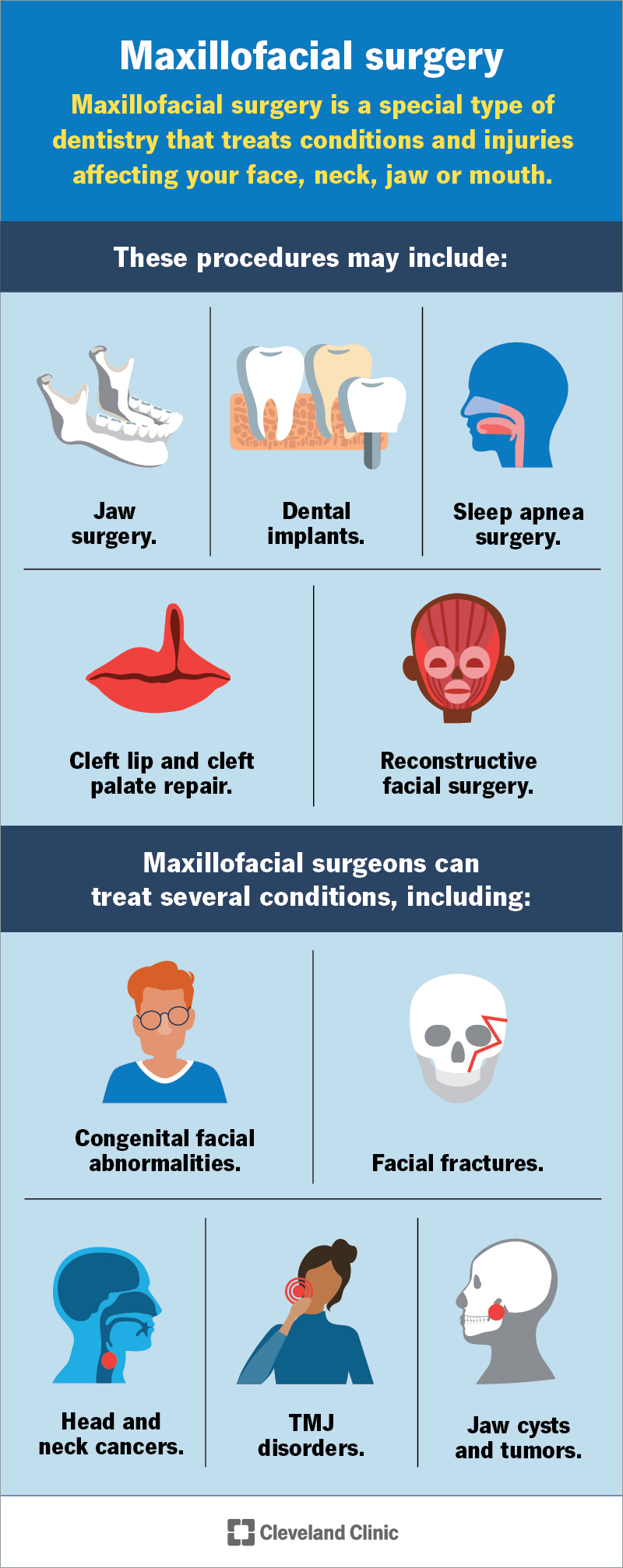Maxillofacial surgery is an operation performed by a highly trained dental surgeon. These procedures can treat diseases or fix injuries of your face, jaw, neck or mouth. Common examples include jaw surgery, cleft palate repair and reconstructive facial surgery.
Advertisement
Cleveland Clinic is a non-profit academic medical center. Advertising on our site helps support our mission. We do not endorse non-Cleveland Clinic products or services. Policy

Image content: This image is available to view online.
View image online (https://my.clevelandclinic.org/-/scassets/Images/org/health/articles/maxillofacial-surgery)
Maxillofacial surgery is a special type of dentistry. It’s similar to oral surgery. But in addition to treating conditions affecting your mouth, it also treats conditions affecting your jaw, face and neck.
Advertisement
Cleveland Clinic is a non-profit academic medical center. Advertising on our site helps support our mission. We do not endorse non-Cleveland Clinic products or services. Policy
Maxillofacial surgeries may include:
If your dentist thinks you need maxillofacial surgery, they’ll refer you to a specialist for an evaluation.
Maxillofacial surgeons can treat several conditions, including:
Oral surgeons and maxillofacial surgeons have the same education and credentials. They also do some of the same procedures. For example, they both extract teeth, do bone grafts and place dental implants. But maxillofacial surgeons also do more complex procedures like reconstructive facial surgery.
Oral surgeons usually have private practices and work from outpatient surgery centers. Maxillofacial surgeons typically work in hospitals.
It depends on your situation. Some procedures take a single visit. Others require a staged approach and multiple appointments.
Advertisement
Your healthcare provider will tell you what to expect. But here’s a general idea of what happens the day of your surgery:
After maxillofacial surgery, your healthcare team will move you to a recovery room. As the anesthesia wears off, you may have some discomfort. Your healthcare provider will prescribe medication to help.
Normal side effects include:
Your surgeon will talk to you about how the procedure went and tell you what to expect during recovery. When they clear you to go home, you’ll need someone you trust to drive you.
Your stitches will dissolve in about a week. Or your surgeon will remove them during your follow-up visit.
Benefits of maxillofacial surgery include:
Possible complications of maxillofacial surgery include:
Your healthcare provider will check for these complications during your follow-up visits.
Recovery after maxillofacial surgery depends on the type of procedure you have. You’ll likely have some discomfort, sensitivity, swelling and bleeding.
Advertisement
For extractions or dental implants, recovery may last around a week or two. More complex procedures, like jaw surgery, may require several months of healing. In these cases, you’ll be able to resume most normal activities, but you may have dietary restrictions. Your healthcare provider can let you know what to expect in your situation.
Your healthcare provider will give you specific instructions. Here are some general guidelines to follow in the meantime:
Until your healthcare provider tells you it’s OK, you should avoid:
No one likes to hear they need surgery. And surgery on your face or mouth can feel especially intrusive. If you’re one of the millions of people with dental anxiety, you might consider skipping treatment altogether. That’s understandable. But without surgery, your condition may worsen. Today, maxillofacial surgeons use advanced techniques that help you heal faster. Talk to your healthcare provider if you have concerns. They can help you weigh your options.
Advertisement

Sign up for our Health Essentials emails for expert guidance on nutrition, fitness, sleep, skin care and more.
Learn more about the Health Library and our editorial process.
Cleveland Clinic’s health articles are based on evidence-backed information and review by medical professionals to ensure accuracy, reliability and up-to-date clinical standards.
Cleveland Clinic’s health articles are based on evidence-backed information and review by medical professionals to ensure accuracy, reliability and up-to-date clinical standards.
Cleveland Clinic’s oral and maxillofacial surgery experts can help repair problems with your mouth, teeth and jaw with personalized treatment.
